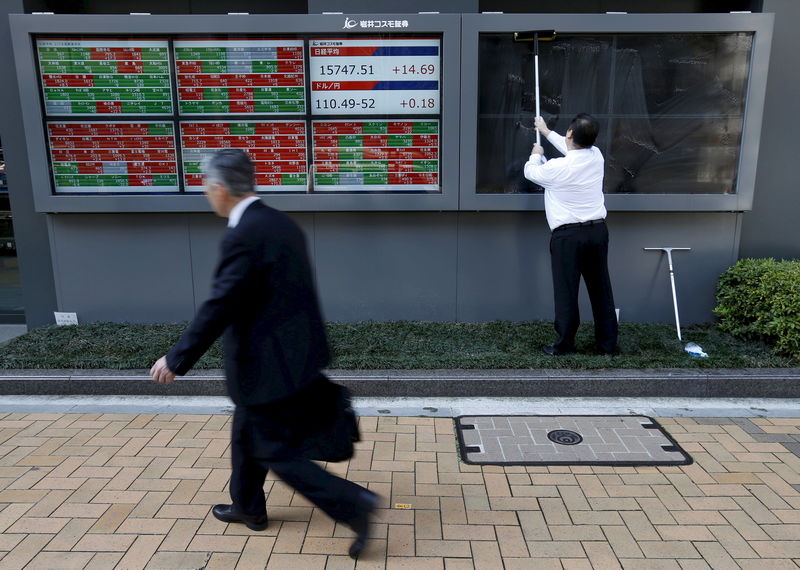This post was originally published on this site
https://i-invdn-com.akamaized.net/trkd-images/LYNXMPEFAR01I_L.jpg
By Tom Westbrook
SINGAPORE (Reuters) – Asian share markets wobbled on Thursday as concerns that tensions over Hong Kong could stymie a U.S.-China trade deal cast a pall over Thanksgiving cheer from unexpectedly positive U.S. economic data.
U.S. President Donald Trump on Wednesday signed into law congressional legislation backing pro-democracy protesters in Hong Kong despite angry objections from Beijing.
MSCI’s broadest index of Asia-Pacific shares outside Japan () was little changed in early trade, while Japan’s Nikkei () flitted in and out of positive territory.
Australia’s S&P/ASX 200 () touched a record intraday high in early trade, and was up 0.3%.
“In the short term you can’t fight the positive momentum,” said Michael McCarthy, chief markets strategist at brokerage CMC Markets in Sydney.
He said that fallout from the Hong Kong legislation could yet unstuck U.S-China trade talks, but that markets were still priced for a deal.
“If it’s not delivered, there’ll be real concern.”
The next round of U.S. tariffs on Chinese goods is due to take effect on Dec. 15.
Wall Street indexes hit fresh record highs overnight, buoyed by trade deal hopes and data showing U.S. economic growth picked up slightly in the third quarter, rather than slowing as first reported.
The Dow Jones Industrial Average () rose 0.15%, the S&P 500 () gained 0.42% and the Nasdaq () added 0.66%. U.S. markets are closed for Thanksgiving on Thursday. ()
Other data showed the number of Americans filing claims for jobless benefits fell. There are signs the downturn in business investment may be drawing to a close and the U.S. Federal Reserve said the outlook was bright.
“Concerns the US economy may be turning down, to the point where the Fed might have to resume policy easing next year, have been somewhat assuaged,” said Ray Attrill, head of FX strategy at National Australia Bank. “So relief all round.”
HONG KONG JITTERS
Currency markets were more circumspect.
The dollar and trade-exposed currencies were spurned and safe-havens such as the Japanese yen sought after Trump signed the Hong Kong bills into law.
The law is viewed as supportive for anti-government protesters in the city, since it threatens sanctions for human rights violations and seeks to safeguard Hong Kong’s autonomy.
But it has been denounced by China as gross interference in its domestic affairs.
“It’s displeasing to the Chinese side,” said Westpac FX analyst Imre Speizer. “And we are getting close to the point when this deal needs to get signed…the market’s reacting to it as though it might put a snag in the works.”
The yen rose 0.2% to 109.37 yen per dollar, while riskier currencies such as the Australian dollar fell by the same margin to $0.6763.
The British pound bobbed higher after a model for pollsters YouGov, which accurately predicted the 2017 election, said Prime Minister Boris Johnson was on course to win a fat majority in parliament at the Dec. 12 election.
Gold was slightly higher. was traded at $1456.9929 per ounce.
U.S. crude () dipped 0.15% to $58.02 a barrel. Brent crude () fell to $64.13 per barrel.
Fusion Media or anyone involved with Fusion Media will not accept any liability for loss or damage as a result of reliance on the information including data, quotes, charts and buy/sell signals contained within this website. Please be fully informed regarding the risks and costs associated with trading the financial markets, it is one of the riskiest investment forms possible.

